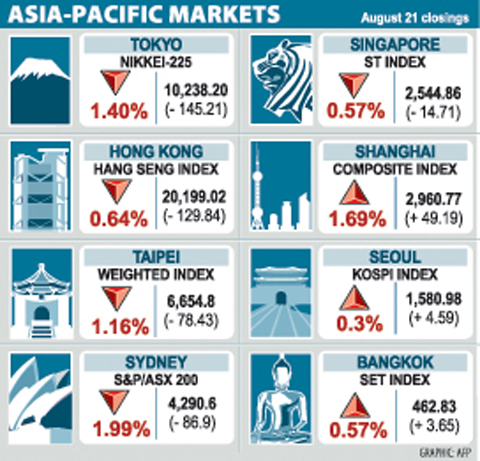Asian stocks fell for the second time in three weeks as concern that China will rein in lending sent the nation’s equities briefly into a bear market and as metal prices retreated.
The Shanghai Composite Index fell as much as 20 percent from its high for this year reached on Aug. 4 as a slump in new lending last month fueled concern growth may decelerate. Rio Tinto Group, the world’s third-largest mining company, lost 6.1 percent in Sydney for the week as earnings missed estimates and prices for metals including copper and nickel fell. Honda Motor Co, Japan’s No. 2 automaker, tumbled 5.3 percent as the US announced the end of the “cash for clunkers” subsidy program.
A plunge in new bank loans in China last month, disappointing earnings and concern Beijing will seek to damp property speculation has sapped confidence, driving down the Shanghai Composite briefly on Friday by the 20 percent threshold that signals a bear market.

The MSCI Asia-Pacific Index lost 3.2 percent this week to 110.61, slipping from the highest level for the year last Friday. The benchmark has rallied: 57 percent since dropping to the lowest in almost six years on March 9.
Japan’s Nikkei 225 Stock Average fell 3.4 percent to 10,238.20 as investors questioned the sustainability of a recovery even as data showed the economy expanded for the first time in more than a year last quarter.
Taiwan’s TAIEX index this week fell 5.9 percent, the region’s worst performance, on concern a possible Cabinet reshuffle next month will delay the signing of a financial agreement with China.
Taiwanese share prices are expected to face a correction next week after the market tumbled in the past week amid a lack of positive clues from corporate earnings reports, dealers said.
For the week to Friday, the weighted index fell 414.71 points, or 5.87 percent, to 6,654.80 after a rise of 2.92 percent the previous week. Average daily turnover came in at NT$92.95 billion (US$2.82 billion) compared with the previous week’s NT$111.04 billion.
“The continued shrinking of trading volume signalled that investors were reluctant to build up positions,” Allen Lin of Concord Securities Co (康和證券) said.
The market is also expected to react to political upheaval as President Ma Ying-jeou (馬英九) faces his worst criticism since coming to office over his handling of Typhoon Morakot and it aftermath.
Three senior Cabinet officials have already tendered their resignations to shoulder responsibility for the government’s response to the tragedy.
“Certainly politics would be a key factor that may drag down the market in the week ahead as investors fear it may ‘engulf’ the Ma administration and lead to political instability,” Chen Yu-yu (陳育娛) of Capital Securities Corp (群益證券) said.
Lin said that since the market fell below the 20-day moving average, it was expected to continue to dive to a range of 6,300-6,400 in the week ahead.

EUROPEAN TARGETS: The planned Munich center would support TSMC’s European customers to design high-performance, energy-efficient chips, an executive said Taiwan Semiconductor Manufacturing Co (TSMC, 台積電), the world’s largest contract chipmaker, yesterday said that it plans to launch a new research-and-development (R&D) center in Munich, Germany, next quarter to assist customers with chip design. TSMC Europe president Paul de Bot made the announcement during a technology symposium in Amsterdam on Tuesday, the chipmaker said. The new Munich center would be the firm’s first chip designing center in Europe, it said. The chipmaker has set up a major R&D center at its base of operations in Hsinchu and plans to create a new one in the US to provide services for major US customers,

The Ministry of Transportation and Communications yesterday said that it would redesign the written portion of the driver’s license exam to make it more rigorous. “We hope that the exam can assess drivers’ understanding of traffic rules, particularly those who take the driver’s license test for the first time. In the past, drivers only needed to cram a book of test questions to pass the written exam,” Minister of Transportation and Communications Chen Shih-kai (陳世凱) told a news conference at the Taoyuan Motor Vehicle Office. “In the future, they would not be able to pass the test unless they study traffic regulations

‘A SURVIVAL QUESTION’: US officials have been urging the opposition KMT and TPP not to block defense spending, especially the special defense budget, an official said The US plans to ramp up weapons sales to Taiwan to a level exceeding US President Donald Trump’s first term as part of an effort to deter China as it intensifies military pressure on the nation, two US officials said on condition of anonymity. If US arms sales do accelerate, it could ease worries about the extent of Trump’s commitment to Taiwan. It would also add new friction to the tense US-China relationship. The officials said they expect US approvals for weapons sales to Taiwan over the next four years to surpass those in Trump’s first term, with one of them saying

BEIJING’S ‘PAWN’: ‘We, as Chinese, should never forget our roots, history, culture,’ Want Want Holdings general manager Tsai Wang-ting said at a summit in China The Mainland Affairs Council (MAC) yesterday condemned Want Want China Times Media Group (旺旺中時媒體集團) for making comments at the Cross-Strait Chinese Culture Summit that it said have damaged Taiwan’s sovereignty, adding that it would investigate if the group had colluded with China in the matter and contravened cross-strait regulations. The council issued a statement after Want Want Holdings (旺旺集團有限公司) general manager Tsai Wang-ting (蔡旺庭), the third son of the group’s founder, Tsai Eng-meng (蔡衍明), said at the summit last week that the group originated in “Chinese Taiwan,” and has developed and prospered in “the motherland.” “We, as Chinese, should never